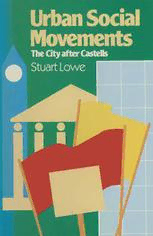
Urban Social Movements: The City After Castells PDF
Preview Urban Social Movements: The City After Castells
Urban Social Movements Urban Social Movements The Ciry After Castells STUART LOWE Macmillan Education ISBN 978-0-333-37520-4 ISBN 978-1-349-18175-9 (eBook) DOI 10.1007/978-1-349-18175-9 © Stuart Lowe, 1986 Softcover reprint of the hardcover 1st edition 1986 All rights reserved. For information, write: Scholarly & Reference Division, St. Martin's Press, Inc., 175 Fifth Avenue, New York, NY 10010 First published in the United States of America in 1986 ISBN 978-0-312-83470-8 Library of Congress Cataloging-in-Publication Data Lowe, Stuart, 1950- Urban social movements. Bibliography: p. Includes index. 1. Cities and towns-History -Cross-cultural studies. 2. Social movements-History-Cross-cultural studies. 3. Castells, Manuel-Criticism and interpre tation. I. Title. HT119.L69 1986 307.7'6 85-22301 ISBN 978-0-312-83470-8 For Sue Contents Acknowledgements IX Introduction 1 1 Castells on Urban Social Movements 8 The urban domain 9 Urban social movements- phase one 17 Urban social movements- phase two 19 2 The City and the Grassroots 29 C rban social change 30 Crban social movements -- phase three 33 Conclusion 48 3 The Mobilisation Process 55 The local political system 55 Social bases and the mobilisation process 60 Ideologies of the urban system 76 Conclusion 80 4 Public Sector Housing Movements 82 Council estates as social bases 82 Tenants' associations in Britain 84 The tenants' movement in Sheffield (1967-84) 94 Political strategies of the tenants' movement 110 Vlll Contents 5 Ideologies in Local Politics - The Ratepayers' and Squatters' Movements 118 The ratepayers' movement 119 Barnsley Ratepayers' Association 124 The squatters' movement 138 Conclusion 150 6 Comparative Urban Social Movements 152 Models of change - the growth or decline of urban social movements? 153 Italy, France and Spain 155 An environmental movement in an East European socialist state 161 Social movements in the United States of America 166 The shanty-towns of South America 173 Models for comparing urban social movements 178 Conclusion 184 7 The Theory and Practice of Urban Social Movements 187 Castells's new urban social movements 187 Analysing urban social movements 193 Urban social movements in Britain in the 1980s 196 References 203 Index 209 Acknowledgements The genesis of this book can be precisely located; it began when Dilys Hill, during the viva for my doctoral thesis, urged me to read in more detail the new urban politics literature. This I subsequently did, and discovered more of its treasures and pitfalls. I am, of course, very grateful to my supervisors at that time, Bill Hampton and Patrick Seyd, for their help in steering me through the hazardous exercise of thesis writing. It was due to them that I set about the long process of seeking a publisher. The end product, however, bears little resemblance to the thesis, although it was a vital stage in the intellectual preparation. The first version of the text was written while I was working as a tutor organiser for the Workers' Educational Association in South Yorkshire; and it bore, at that stage, the hallmarks of that relatively isolated occupation. The current version has been formulated since I moved to the University ofYork, and became able to contact a wider academic community. Peter Saunders, Michael Harloe and Bill Hampton generously gave time to comment on drafts of the early chapters. Bill Hampton and Kathleen jones kindly read at short notice the nearly complete text and made some very useful suggestions. Many thanks are due to James Simmie for suggesting how the first version could be made into a publishable commodity and trusting me to do the job. The creative environment generated by Kathleen jones in the Department ofSocial Policy and Social Work has spurred me on. Our indispensable secretary, Alison Holdsworth, proof-read the manuscript and typed some of the draft version. I am very grateful to Janice Vanham for typing most of the draft and all of the final text. x Acknowledgements But the greatest debt of all is owed to my family for making it possible for me to spend the hundreds of hours necessary to produce a book of this type. January 1985 Stuart Lowe Introduction The previous two decades have seen the field of urban politics transformed from an institutionally rooted, eclectic specialism to a range of studies at the frontiers of our knowledge about the fundamental social and political processes in contemporary societies. Within this new literature an important sub-field, concerning the role of non-party urban movements as initiators of social change, rapidly emerged and now holds a central place in the debates. This theme reflected the abundant and diverse reality of urban protest across the globe, ranging from the black ghetto riots in the USA in the 1960s, to the squatter movements based in the shanty towns of rapidly urbanising societies, to the neighbourhood movement in Spain at the termination of the Franquist era, to the urban protest (particularly the mass movement of tenants) in Italy in the mid-1970s, to the less violent and less intense experience of the council house tenants' movements, redevelopment action groups and environmental organisations that were and remain a familiar feature of city politics in Britain. What do these movements and organisations represent? What effect have they had on social structures and in the policy arena? To what extent does their existence suggest a collapse of the formal procedures of political systems in express ing social conflict? Are there any similarities ofe xperience across the globe that indicate the existence of common 'urban' processes irrespective of economic and political systems? Under what circumstances do people mobilise around urban issues and, by the same token, what factors inhibit or screen out potential urban protest? This book is addressed to these questions. It is focused mainly on Britain, as one country with a particular set of experiences, but the cross-national setting is integral to the approach.
